
![]()
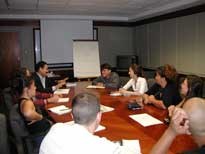 Venezuela
Trip Report
Venezuela
Trip Report
by Marc Becker
I traveled to Venezuela in August 2003 with a Venezuelan Solidarity Group (VSG) delegation. VSG is a network of North American activists who support democracy and equitable development in Venezuela through education and people-to-people solidarity. Although I’ve traveled throughout most of Latin America, this was my first trip to Venezuela. My goal (as well that of the delegation in general) was to deepen my understanding of the Bolivarian Revolution and to build solidarity with the people of Venezuela.
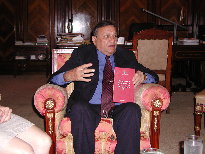 Venezuela is
one of the world’s largest oil producers and a founding member of
OPEC. Rather than benefitting the country as a whole, however, the income
from these resources enriched multinational corporations and a small domestic
oligarchy. Since the 1950s, the country was controlled by two political
parties (AD and Copei) who governed in favor of elite interests and excluded
the vast majority from participating in government. Their neoliberal economic
policies thrust the country into poverty leading to massive street riots
in 1989. Deputy Ricardo Gutiérrez who currently serves as the First
Vicepresident of the National Assembly noted that this “caracazo”
was a social explosion like had never been seen before in Latin America.
“It was the first expression of the awakening of people who wanted
change but did not yet know how to achieve it,” Gutiérrez
noted. In an attempt to break through this political, economic, and social
exclusion, a young military officer named Hugo Chavez led a failed military
coup in 1992. After spending time in prison, he returned to win the presidency
in 1998. He proceeded to rewrite the constitution providing for a more
participatory democracy oriented toward social programs, ushering in what
is known as the Fifth Republic that seeks to govern in favor of the masses
rather than the oligarchy.
Venezuela is
one of the world’s largest oil producers and a founding member of
OPEC. Rather than benefitting the country as a whole, however, the income
from these resources enriched multinational corporations and a small domestic
oligarchy. Since the 1950s, the country was controlled by two political
parties (AD and Copei) who governed in favor of elite interests and excluded
the vast majority from participating in government. Their neoliberal economic
policies thrust the country into poverty leading to massive street riots
in 1989. Deputy Ricardo Gutiérrez who currently serves as the First
Vicepresident of the National Assembly noted that this “caracazo”
was a social explosion like had never been seen before in Latin America.
“It was the first expression of the awakening of people who wanted
change but did not yet know how to achieve it,” Gutiérrez
noted. In an attempt to break through this political, economic, and social
exclusion, a young military officer named Hugo Chavez led a failed military
coup in 1992. After spending time in prison, he returned to win the presidency
in 1998. He proceeded to rewrite the constitution providing for a more
participatory democracy oriented toward social programs, ushering in what
is known as the Fifth Republic that seeks to govern in favor of the masses
rather than the oligarchy.
Chavez faces significant opposition, largely from the old traditional conservative political elite and economic oligarchy who have lost their privileged position in society due to the current government’s policies that favor the poor and marginalized. For example, the oligarchy wants to privatize the state petroleum company PDVSA but instead Chavez uses this revenue to fund social programs. Furthermore, Chavez has proposed developing a “Petroamerica” so that Latin America’s petroleum reserves could be used for human development and social programs rather than corporate enrichment. Such policies lead to defamation campaigns by the opposition, often supported and encouraged by the Bush administration which has close economic ties to the petroleum industry. The elite has an almost complete stranglehold on the Venezuelan media, and uses these resources in a relentless propaganda war against the Chavez government. They fear that a deepening of the revolutionary process would further deprive them of their privilege. Many people in the middle and upper classes live in a virtual world where their view of reality is fed through the TV screen, and this endless bombardment has convinced them that Chavez must go. The opposition largely representing traditional political parties and elite economic interests seeks to oust his democratically elected government through any means necessary.
One of the currently hotly debated issues in Venezuela is a proposed referendum which the opposition hopes would remove Chavez from power. In a largely unprecedented move, Chavez wrote language into the 1999 constitution that allows voters to remove any elected official from office midway through their terms. Political commentators often note the apparent irony that Chavez’ own legislation would be used against him, while ignoring that such legislation indicates that far from being a dictator the president has not sought out unconstitutional means to extend his time in office. While polls indicate that Chavez would currently lose such a recall vote, his supporters believe that they will win based on his firm support in marginalized neighborhoods that do not register with middle-class polling techniques.
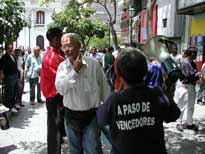 Next
to the municipal building on Plaza Bolívar, Caracas’ main
square, is what is called the “esquina caliente”–the
hot corner. Chavez’ supporters gather here and loudly champion their
hero. For many common people, Chavez represents their first engagement
with political debate. It has, as people acknowledge, loosened their tongues.
These new activists do not hesitate to pontificate endlessly about the
virtues of Chavez’ government. For them, Chavez represents change
and a hope for a better future. This converts into a “Radio Bemba”
where, through word of mouth, networks in support of revolutionary changes
in Venezuela develop.
Next
to the municipal building on Plaza Bolívar, Caracas’ main
square, is what is called the “esquina caliente”–the
hot corner. Chavez’ supporters gather here and loudly champion their
hero. For many common people, Chavez represents their first engagement
with political debate. It has, as people acknowledge, loosened their tongues.
These new activists do not hesitate to pontificate endlessly about the
virtues of Chavez’ government. For them, Chavez represents change
and a hope for a better future. This converts into a “Radio Bemba”
where, through word of mouth, networks in support of revolutionary changes
in Venezuela develop.
Chavez’ supporters often note that the success of his programs are limited because while his party (the Movimiento Quinto República) is in government, they are not in power and the oligarchy still controls much of the country. For example, people who actively agitate against Chavez remain in leadership positions in places like the national petroleum company PDVSA and in Venezuelan consulates in the United States and Spain. Nevertheless, we witnessed the advances of the Bolivarian Revolution in three main areas of literacy, health care, and agrarian reform.
 Misión Robinson
(Robinson Mission) is a literacy campaign named after Simón Rodríguez,
Simón Bolívar’s mentor who was nicknamed Robinson
because of his fascination with the Robinson Crusoe novel. The program
is based on the Cuban literacy campaign that largely eradicated illiteracy
from the island in 1961. Venezuela, which has 1.2 million illiterate people,
is the eighteenth country to use this model. The Cuban-designed program
is very successful and has won five UNESCO awards. We observed a literacy
class in a senior citizen center, and later met with Gilda Laya who works
with the National Institute of Education Corporation (INCE) that provides
technical assistance to the program. Although the program only started
on July 1 and is still in its early stages, it is realizing notable success.
Misión Robinson
(Robinson Mission) is a literacy campaign named after Simón Rodríguez,
Simón Bolívar’s mentor who was nicknamed Robinson
because of his fascination with the Robinson Crusoe novel. The program
is based on the Cuban literacy campaign that largely eradicated illiteracy
from the island in 1961. Venezuela, which has 1.2 million illiterate people,
is the eighteenth country to use this model. The Cuban-designed program
is very successful and has won five UNESCO awards. We observed a literacy
class in a senior citizen center, and later met with Gilda Laya who works
with the National Institute of Education Corporation (INCE) that provides
technical assistance to the program. Although the program only started
on July 1 and is still in its early stages, it is realizing notable success.
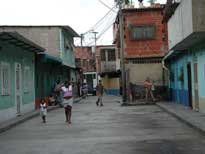 Barrio Adentro (Into
the Neighborhood) is a government program that brings Cuban doctors and
medicine to poor and marginalized neighborhoods. We met with Dr. Redelio
Rendón Fernández, the director of the program, and Dr. Retilio
Gordo Gómez, a doctor serving in the Progreso neighborhood of Caracas.
The doctors are volunteers who receive a small monthly stipend for serving
in this program and are motivated by humanitarian desires to serve people.
For many of these doctors, this act of solidarity represents a sacrifice
as they leave their family to work in conditions which are often more
difficult than what they would encounter at home, fighting against common
illnesses that have been eradicated in Cuba. The opposition denounces
the program as evidence of Cuban intervention into internal Venezuelan
affairs, but the doctors serve anyone in need without regard to religion,
ethnicity, or political affiliation, and they do not engage in propaganda
in favor of either the Venezuelan or Cuban governments. Rather, the program
provides medical care in areas which previously had not received such
attention. For Venezuela’s poor, it is a program which they see
has evidence that Chavez cares about them and has led to a growing support
for his government.
Barrio Adentro (Into
the Neighborhood) is a government program that brings Cuban doctors and
medicine to poor and marginalized neighborhoods. We met with Dr. Redelio
Rendón Fernández, the director of the program, and Dr. Retilio
Gordo Gómez, a doctor serving in the Progreso neighborhood of Caracas.
The doctors are volunteers who receive a small monthly stipend for serving
in this program and are motivated by humanitarian desires to serve people.
For many of these doctors, this act of solidarity represents a sacrifice
as they leave their family to work in conditions which are often more
difficult than what they would encounter at home, fighting against common
illnesses that have been eradicated in Cuba. The opposition denounces
the program as evidence of Cuban intervention into internal Venezuelan
affairs, but the doctors serve anyone in need without regard to religion,
ethnicity, or political affiliation, and they do not engage in propaganda
in favor of either the Venezuelan or Cuban governments. Rather, the program
provides medical care in areas which previously had not received such
attention. For Venezuela’s poor, it is a program which they see
has evidence that Chavez cares about them and has led to a growing support
for his government.
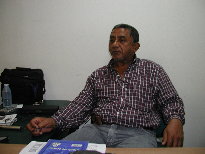 The Venezuelan government
named its agrarian reform program Plan Zamora after Eziekel Zamora who,
like Emiliano Zapata in Mexico, was a noted agrarian thinker in Venezuela.
As Venezuela shifted in the 1950s from an agricultural to a petroleum-based
economy, peasants became more impoverished and excluded while a small
handful of families owned vast tracts of land that remained unused. Many
people ended up living in slums without electricity, water, or work in
poverty belts that surrounded the cities. Braulio Alvarez, national director
of the National Land Institute (INTI), noted how Chavez’ government
has sought to reverse that trend with the distribution of one million
hectares of land and 250 tractors that benefit 43,000 families so far
this year, with the goal of doubling that by the end of the year. Under
Chavez, peasants have gained hope and become protagonists in developing
a better future.
The Venezuelan government
named its agrarian reform program Plan Zamora after Eziekel Zamora who,
like Emiliano Zapata in Mexico, was a noted agrarian thinker in Venezuela.
As Venezuela shifted in the 1950s from an agricultural to a petroleum-based
economy, peasants became more impoverished and excluded while a small
handful of families owned vast tracts of land that remained unused. Many
people ended up living in slums without electricity, water, or work in
poverty belts that surrounded the cities. Braulio Alvarez, national director
of the National Land Institute (INTI), noted how Chavez’ government
has sought to reverse that trend with the distribution of one million
hectares of land and 250 tractors that benefit 43,000 families so far
this year, with the goal of doubling that by the end of the year. Under
Chavez, peasants have gained hope and become protagonists in developing
a better future.
An irony we observed is people who benefit from Chavez’ programs who do not support his government. For example, María León, the director of the National Women’s Institute (INAMUJER) noted Chavez’ significant commitment to women’s issues including the establishment of a domestic abuse hotline and a shelter for abused women. Elite women who are otherwise opposed to his government embrace these polices as positive developments. In addition, Chavez was supportive of the inclusion of 100 percent of the institute’s proposals in the new constitution. These include women’s reproductive/family planning rights, the legal recognition of women’s work as mothers and caretakers and their right to social security or welfare payments from the government. The constitution is also groundbreaking in that the language used is gender-balanced, breaking through some of the sexism inherent in the Spanish language. For example, rather than referring to “parents” as los padres, it specifies las madres y los padres and rather than referring to “children” as los niños, it specifies las niñas y los niños.
Chavez’ supporters note that it is critically necessary for the government to communicate their achievements more effectively to the public in order to survive. Many activists also recognize the necessity of international solidarity networks in order to assure the survival of their political project. INAMUJER has an international solidarity component committed to linking up women around the world, to promoting the successes and advances made by Venezuelan women in addition to the social and economic policies of the Chavez government.
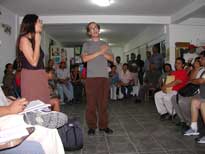 Chavez’ strongest
base of support is from the most excluded sectors of society, particularly
those in poor urban neighborhoods, peasants and Indigenous peoples, and
Afro-Venezuelans. Andrés Antillano who works with the neighborhood
association Comité de Tierras noted that “the victory of
the president is the result of a long struggle of people in the barrios
against exclusion. We identify with Chavez because he recognizes our rights
as a people.” An Afro-Venezuelan woman added that “what we
have no one gave to us. The only thing that Chavez wants is that we control
our own destiny.” Nicia Maldonado, the General Coordinator General
of the Venezuelan National Indian Council (CONIVE) noted that traditional
political parties always attempted to manipulate Indigenous communities
only to get their votes, but that with Chavez they live a different reality.
“We want respect,” Maldonado stated, “and we support
Chavez not because he is Black but because he represents dignity not only
for Venezuela but for all of America. We are human beings, and he supports
us.”
Chavez’ strongest
base of support is from the most excluded sectors of society, particularly
those in poor urban neighborhoods, peasants and Indigenous peoples, and
Afro-Venezuelans. Andrés Antillano who works with the neighborhood
association Comité de Tierras noted that “the victory of
the president is the result of a long struggle of people in the barrios
against exclusion. We identify with Chavez because he recognizes our rights
as a people.” An Afro-Venezuelan woman added that “what we
have no one gave to us. The only thing that Chavez wants is that we control
our own destiny.” Nicia Maldonado, the General Coordinator General
of the Venezuelan National Indian Council (CONIVE) noted that traditional
political parties always attempted to manipulate Indigenous communities
only to get their votes, but that with Chavez they live a different reality.
“We want respect,” Maldonado stated, “and we support
Chavez not because he is Black but because he represents dignity not only
for Venezuela but for all of America. We are human beings, and he supports
us.”
Competing visions of whom Venezuelan state structures should benefit threaten to throw the country into civil war. Having failed to unseat Chavez through legal and constitutional means, the opposition openly advocates for a military coup (similar to that which failed in April of 2002) or the assassination of Chavez. If the opposition does succeed in removing Chavez from power, some fear a repeat of what happened in neighboring Colombia after the popular leftist politician Jorge Eliecer Gaitan was killed in 1948. This bogotazo thrust the country into more than half a century of intense violence and ended lower class dreams of gaining social justice through peaceful and legal means.
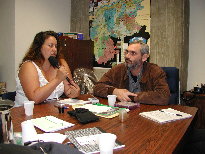 Seventy agrarian leaders
have been killed in Venezuela in the past year, but unlike in Colombia
it is not the government or forces allied with it that has persecuted
and assassinated popular leaders. Rather, it is the conservative opposition
who has been implicated in these violations of human rights and the repression
of other freedoms. As the deputy to the National Assembly Adel El Zabayar
Samara noted, the lack of censorship or a single political prisoner even
though the opposition attempted a military coup against the government
last year demonstrates that far from being a dictatorship the government
is very open.
Seventy agrarian leaders
have been killed in Venezuela in the past year, but unlike in Colombia
it is not the government or forces allied with it that has persecuted
and assassinated popular leaders. Rather, it is the conservative opposition
who has been implicated in these violations of human rights and the repression
of other freedoms. As the deputy to the National Assembly Adel El Zabayar
Samara noted, the lack of censorship or a single political prisoner even
though the opposition attempted a military coup against the government
last year demonstrates that far from being a dictatorship the government
is very open.
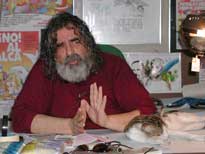 Venezuelans we met with
noted that although the United States government opposes the Chavez government,
they do not harbor antagonistic feelings toward North Americans. As the
artist El Tano observed, “el pueblo es uno y también
el enemigo” (“the people are one and so is the enemy”).
I was struck by the parallels between the struggles in Venezuela and the
United States. Political discourse in both countries is shaped by a propagandistic
news media that services elite political and economic interests. This
oligarchy seeks to impose neoliberal economic policies that are designed
to cut social services including education and health care from poor and
marginalized populations while at the same time further enriching the
wealthy. We need to unite our struggles in order to defend ourselves from
these common threats. The theme from the World Social Forum that another
world is possible is often repeated in Venezuela. Together we can build
that better future.
Venezuelans we met with
noted that although the United States government opposes the Chavez government,
they do not harbor antagonistic feelings toward North Americans. As the
artist El Tano observed, “el pueblo es uno y también
el enemigo” (“the people are one and so is the enemy”).
I was struck by the parallels between the struggles in Venezuela and the
United States. Political discourse in both countries is shaped by a propagandistic
news media that services elite political and economic interests. This
oligarchy seeks to impose neoliberal economic policies that are designed
to cut social services including education and health care from poor and
marginalized populations while at the same time further enriching the
wealthy. We need to unite our struggles in order to defend ourselves from
these common threats. The theme from the World Social Forum that another
world is possible is often repeated in Venezuela. Together we can build
that better future.